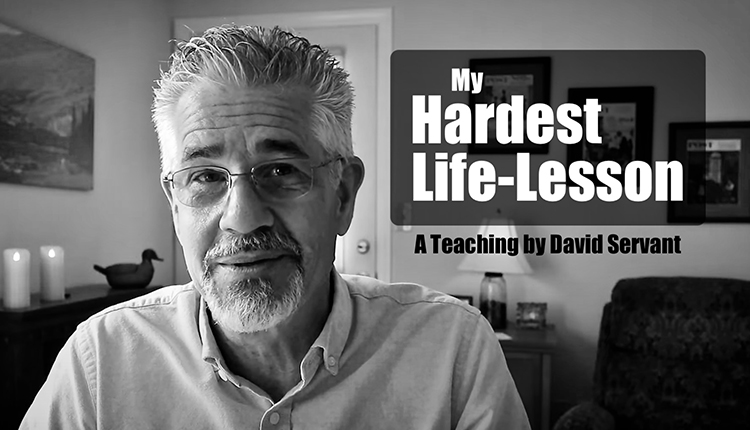
Now having 66 years to look back on, I can recall lots of ups and downs, and plenty of twists and turns, of my life’s journey. I’ve learned so many lessons along the way. How I wish I could have begun adulthood with the wisdom I’ve accumulated over the past five decades. It would have saved me so much pain!
For some reason, one of the hardest lessons for me has been one that took me the longest to learn. I repeatedly made the same mistake, never getting any wiser. Finally, however, during a particularly painful period a few years ago, I got the memo from heaven. Now I hope to pass it on to you so that you can avoid what I didn’t!
The wisdom that I lacked for so long is encapsulated in this semi-cryptic proverb:
He who is guarantor for a stranger will surely suffer for it,
But he who hates being a guarantor is secure (Prov. 11:15).
After reading that proverb, you may suspect that I’ve repeatedly co-signed loans for strangers, guaranteeing that I will repay the bank if they don’t. Actually, however, I’ve never co-signed a loan for anyone. I have, however, repeatedly violated the greater principle that is the foundation of that proverb. That is, I’ve trusted people whom I should not have trusted. And I’ve “suffered for it”—just as that proverb warns—repeatedly.
Here’s the lesson I’ve learned in a nutshell: We are foolish to trust anyone who has not earned our trust.
Of course, trusting someone in a small matter is much less risky than trusting them in a large matter. We all trust strangers in small ways, and when those people prove untrustworthy, our suffering is relatively minor. However, I am referring in this article—as is Proverbs 11:15—to trusting people in larger matters. Co-signing loans for strangers is just one example of a large matter that can end in suffering.
This, by the way, is why banks investigate your credit history before they will give you a loan. They know they can predict your future by looking at your past. If you’ve failed to repay previous loans, that is a good indication that you are very likely to not repay future loans. How I wish I had exercised the universal wisdom of banks before I ever trusted people who later caused me so much grief! If I had only investigated their past, I would have known exactly what the future held.
This is also why smart employers require résumés and references from potential employees. If everything checks out, multiple interviews begin that are conducted by more than one person. If trust grows enough, an offer is made, but it comes with an employment agreement that stipulates all expectations in writing, because employers know that even well-vetted employees are still a risk. So they leave themselves an escape. During that same process, wise job-seekers are similarly doing their due diligence about the company to which they are applying. They too, should be wary, and are wise to interview former and current employees. The goal for both parties is to become less like strangers.
This is also why we date before we get married. Marrying a stranger is dangerous. Marrying a casual friend is less dangerous, but still risky. How many folks have discovered something after marriage that they wish they’d discovered before, something that would have been a deal-breaker?
I once signed a contract with a “Christian” contractor to build a house for me. The name of his company was “Cornerstone Construction” (sure sounds Christian!) and his slogan was “Where Honesty and Integrity Meet.” Had I spoken with a few of his previous customers (which I ultimately did), I could have avoided a horrible experience that ended up in binding arbitration (which I won). I’ve consequently learned to beware of anyone who tries to circumvent the vetting, trust-building process by means of a Christian label. They expect you to automatically trust them “because we’re brothers.” I’ve learned that, too often, those kinds of people aren’t my “brothers” at all. These days, when I see a little fish on someone’s business card or sign, I assume that it stands for “I’m fishy.”
Apart from divine revelation, there is actually no way to be 100% certain about anyone. And for that reason, I’ve also learned (the hard way) to escape quickly when I realize that I’ve trusted someone whom I should not have trusted. The length of time that you delay confronting someone like that is directly proportional to the degree of pain you will suffer. Take it from someone who knows.
What is it that makes us give our trust to people who don’t deserve it? I’ve tried to honestly analyze the underlying motives that resulted in my own mistakes. They range from sincere empathy and love (“he just got out of prison and needs a job, so I’ll give him one”), to personal ambition (“joining forces with him will benefit me”) and even desperation (“surely this person will deliver me from my problem”). How I wish I would have slowed down to analyze my motives before jumping into the quicksand that looked like solid ground.
In closing, please allow me to paraphrase Proverbs 11:15:
He who grants undeserved trust will suffer for it,
But he who knows better will save himself a lot of pain.

